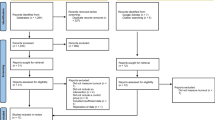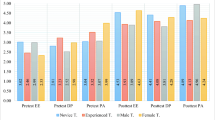Abstract
Since I developed rational-emotive education (REE) and first presented the system in 1974, it has become clinically and empirically clear that this positive mental-health approach has significant practical value for counselors and teachers who deal daily with a broad spectrum of child and adolescent adjustment problems. Moreover, the system gains potency through its dual application: as a preventive mental health system and as a counseling intervention system.
Access this chapter
Tax calculation will be finalised at checkout
Purchases are for personal use only
Preview
Unable to display preview. Download preview PDF.
Similar content being viewed by others
References
Albert, S., (1972).A study to determine the effectiveness of affective education with fifth grade students, Unpublished master’s thesis, Queens College.
Behrman, J. K., (1978).The ecology of group home parenting: Role stresses and personal adjustments. Unpublished doctoral dissertation, University of Nebraska.
Bernstein, R. J., (1960).Dewey on experience, nature, and freedom. New York: Liberal Arts Press.
Bingham, T. (1982).Program for effective learning. Blanding, VT: Metra.
Block, J. (1978). Effects of a rational emotive mental health program on poorly achieving, disruptive, high school students.Journal of Counseling Psychology,25(1), 61–65.
Brody, M., (1974).The effect of rational-emotive affective approach in anxiety, frustration tolerance, and self-esteem with fifth grade students. Unpublished doctoral dissertation, Temple University.
Casper, E., (1981).A study to determine the effectiveness of rational-emotive education upon the academic achievement of sixth-grade children. Unpublished doctoral dissertation. University of Virginia.
DiGiuseppi, R., (1975). The use of behavior modification to establish rational self-statements in children.Rational Living,10(2), 18–20.
DiGiuseppi, R., & Kassinove, H., (1976). Effects of rational emotive school mental health program on children’s emotional adjustment.Journal of Community Psychology,4(4), 382–387.
Ellis, A. (1962).Reason and emotion in psychotherapy. Secaucus, NJ; Lyle Stuart.
Ellis, A. & Bernard, M. E. (Eds.). (1983).Rational-emotive approaches to the problems of childhood, New York: Plenum Press.
Ellis, A. & Whiteley (Eds.). (1979).Theoretical and empirical foundations of rational-emotive psychotherapy, Monterey CA: Brooks/Cole.
Farber, B. A., (1978).The effects of psychotherapeutic practice upon the psychotherapist: A phenomenological investigation. Unpublished doctoral dissertation, Yale University.
Ford, R. (Ed.). (1897).The New England primer, New York: Dodd, Mead.
Fulcher, L. C., (1979). Keeping staff sane to accomplish treatment.Residential and community child care administration,1, (1), 69–85.
Gerald, M., & Eyman, W. (1980).Thinking straight and talking sense: An emotional education program. New York: Institute for Rational Emotive Therapy.
Hull, C., (1952).A behavior system: An introduction to behavior theory concerning the individual organism. New Haven: Yale University Press.
Katz, S., (1974).The effects of emotional education on locus of control and self-concept. Doctoral dissertation, Hofstra University.
Knaus, W. J. (1970, January). Innovative use of parents and teachers as behavior modifiers. Paper presented at the Seventh annual school psychologists conference, Queens College, New York.
Knaus, W. J., (1974).Rational emotive education: A manual for elementary school teachers. New York: Institute for Rational-Emotive Psychotherapy.
Knaus, W. J., (1977a). Rational emotive education. In A. Ellis, & R. Greiger (Eds.),Handbook of rational emotive therapy(pp. 398–408). New York: Springer.
Knaus, W. J., (1977b). Rational emotive education.Theory into Practice,14(4), 251–255.
Knaus, W. J., (1979).Do it now: How to stop procrastinating. Englewood Cliffs, NJ: Prentice- Hall.
Knaus, W. J. (1982a).How to get out of a rut. Englewood Cliffs, NJ: Prentice-Hall.
Knaus, W. J. (1982b). The parameters of procrastination. In Greiger R. & Greiger, I. (Eds.).Cognition and emotional disturbance. New York: Human Science Press.
Knaus, W. J. (1983a).How to conquer your frustrations. Englewood Cliffs, NJ: Prentice-Hall.
Knaus, W. J. (1983b). Children and low frustration tolerance. In A. Ellis, & M. E. Bernard, (Eds.),Rational-emotive approaches to the problems of childhood, New York: Plenum Press.
Knaus, W. J., & Bokor, S. (1975). The effects of rational emotive education lessons on anxiety and self-concept in sixth-grade students,Rational Living,11(2), 25–28.
Knaus, W. J., & Eyman, W. (1974). Progress in rational emotive education.Rational Living,2, 27–29.
Knaus, W. J., & McKeever, C. Rational emotive education with learning disabled children.Journal of learning disabilities, 10(1), 10–14.
Kohlberg, L. (1975). The cognitive developmental approach to moral development.Phi Delta Kappa,56(10), 671.
Krenitsky, D. L. (1978). The relationship of age and verbal intelligence to the efficacy of rational-emotive education with older adults, Doctoral dissertation, Hofstra University.
Leopold, H. (1984).Cognitive training with seriously disturbed children: Effects of cognitive level, cognitive strategy, and additional time in training. Unpublished doctoral dissertation, Hofstra University.
Lester, D., & Mink, S. B. (1979). Is stress higher in police officers? An exploratory study.Psychological Reports,45(2), 554.
MacFarlane, J. W., Allen, L., & Honzik, M. P. (1962).A developmental study of the behavior problems of normal children between 21 months and 14 years. Berkely, CA: University of California Press.
Mackay, C. J., & Cox, T. (1979).Response to stress: Occupational aspects. England: Guilford Press.
Maslach, C., & Jackson, E. (1979). Burned out cops and their families.Psychology Today,12(12), 58–62.
Mayo, E. (1933).Human problems of industrial civilization. New York: Macmillan.
McGuire, W. H. (1979). Teacher Burnout.Today’s Education,68(4), 5.
Miller, N. J. (1977). Effects of behavior rehearsal, written homework assignments, and level of intelligence on the efficacy of rational-emotive education in elementary school children. Doctoral dissertation, Hofstra University.
Piaget, J., & Inhelder, B. (1970).The psychology of the child. New York: Basic Books.
Skinner, B. F., (1965, October). Why teachers fail.Saturday Review, pp. 80–82, 90–103.
Sneath, H. E., & Hodges, G. (1913).Moral training in the school and home: A manual for teachers and parents. New York: Macmillan.
Storlie, F. J. (1979). Burnout: An elaboration of a concept.American Journal of Nursing,79(12), 2018–2111.
Williams, J. M. (1981).An exploratory look at alienation in elementary school children. New York: Springer.
Woody, R. (1969).Behavior problem children in the schools. New York: Appleton-Century- Crofts.
Author information
Authors and Affiliations
Editor information
Editors and Affiliations
Rights and permissions
Copyright information
© 1985 Institute for Rational-Emotive Therapy
About this chapter
Cite this chapter
Knaus, W.J. (1985). Student Burnout. In: Ellis, A., Bernard, M.E. (eds) Clinical Applications of Rational-Emotive Therapy. Springer, Boston, MA. https://doi.org/10.1007/978-1-4613-2485-0_11
Download citation
DOI: https://doi.org/10.1007/978-1-4613-2485-0_11
Publisher Name: Springer, Boston, MA
Print ISBN: 978-1-4612-9506-8
Online ISBN: 978-1-4613-2485-0
eBook Packages: Springer Book Archive




